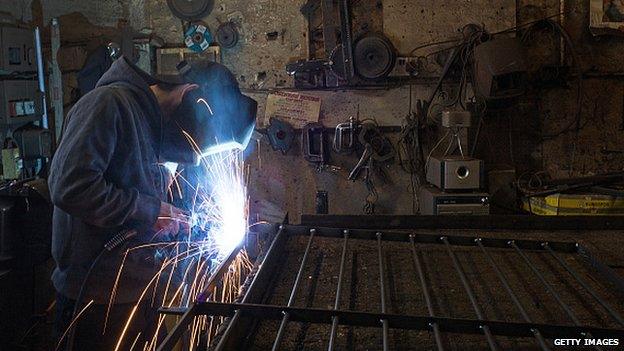Why the economy matters in this election
- Published
The UK economy explained
The economy is improving but does that mean people are feeling better off? Does a lower deficit mean more pounds in people's pockets? Voters will ask themselves which party is likely to help them the most by improving the economy and controlling public finances.
What's at stake?
In 2014, UK economic growth was among the fastest of all major world economies and 2015 could be another strong year. But a number of factors could depress UK growth.
While the employment rate is increasing, wages have only recently started to grow faster than inflation. There are also reports that many people would like to work more than are able to.
The government has reduced the deficit by around a third, but debt interest payments and rising social care costs mean public borrowing is higher than the government had hoped.
With growth slowing in the eurozone and China, the UK could also be vulnerable to external risks.

What are the numbers?
The UK deficit (or net public sector borrowing) in 2013-14 was £98.5bn, according to February's figures from the Office for National Statistics - less than the figure for 2012-13, which was £119.7bn. This excludes the cost to the government of holding stakes in Royal Bank of Scotland and Lloyds Banking Group.
At the end of February 2015, public sector net debt (again excluding public sector banks) was £1,468.5bn (79.6% of GDP) - an increase of £83.6bn compared with February 2014.
There were 30.9 million people in work between October and December 2014 - 608,000 more than during the same months last year.
The employment rate for the three months to December was 73.2%, the joint highest employment rate since comparable records began in 1971. The last time it was this high was between December 2004 and February 2005.

The economy in numbers
2.8%
UK economic growth in 2014
£90.2bn
OBR deficit forecast for 2014-15
-
5.7% unemployment rate, Oct to Dec 2014
-
1.4% average annual increase in weekly earnings, 2009-2014
-
0.3% record low inflation rate (Consumer Prices Index), Jan 2015

What won't the politicians be saying?

Employment in the three months to December reached record highs
We know that the main UK parties have very different visions of how they would go about trying to reduce the deficit.
But whoever is in power will have to oversee major changes to public finances that will almost certainly involve significant spending cuts and probably tax rises. The full extent and impact of these may not become fully clear until after the election.
Another important economic question is how interest rates will change. That is not a matter for politicians but something for the Bank of England to decide. When the main Bank rate will rise or whether it will drop from its current - and record - low of 0.5%, remains to be seen.

What has happened since 2010?
Public borrowing shrank from £153bn in 2009-10 to £98.5bn in 2013-14
Economy grew by 7.8% between the second quarter of 2010 and the last quarter of 2014
Employment has grown and wages now rising faster than inflation, but some doubt whether all UK is sharing in economic recovery
Inflation as measured by the Consumer Prices Index was 3.4% in May 2010. Rose to a high of 5.2% in September 2011 and since fallen to record low of 0.3% in January 2015

What do the experts say?
"One of the main challenges is continuing to get the deficit down and at the same time not choking off growth. While the economy has continued to improve attempts to bring down the deficit have been less impressive. Whoever is in power after the election will have to tackle that, as well as trying to sustain public services" - Howard Archer, chief European and UK Economist, IHS Global Insight
"All the major political parties also are not yet talking about any significant tax rises in the next parliament. However, history suggests that the year after an election quite often sees significant tax increases even if those have not yet been talked about pre-election" - Gemma Tetlow, programme director, Institute for Fiscal Studies